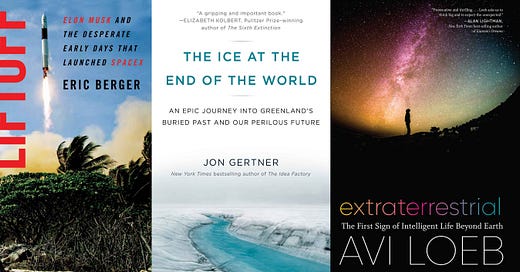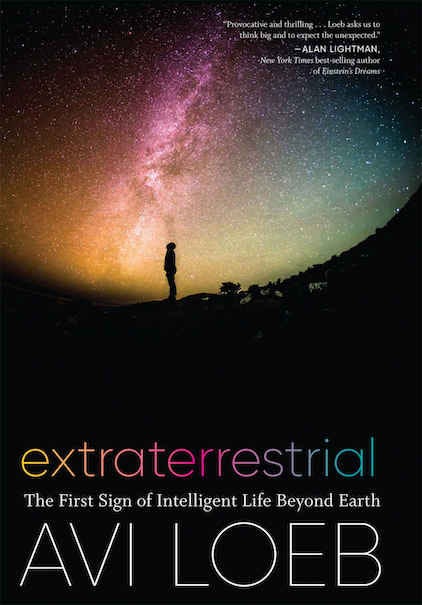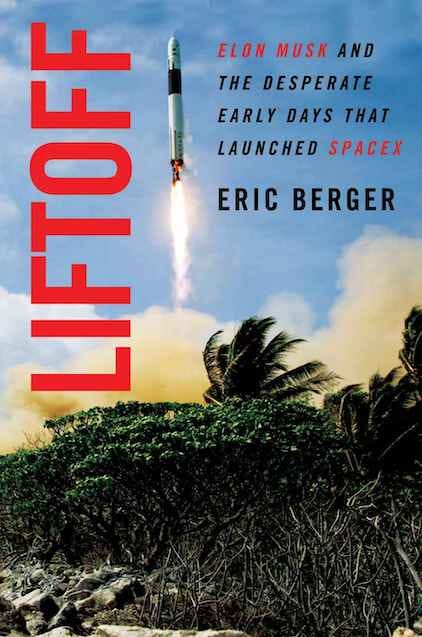3 Engaging Non-Fiction Books for your Summer 2021 Reading List
Three different recommendations to broaden your perspective
Summer is here! Whether your spending your summer holidays at home in a Staycation, or off in your isolated cabin deep in the mountains, here are three books you might consider bringing along to keep you entertained during your downtime. Each one covers a completely different topic and might help broaden your perspective.
We've heard a lot about climate change so far in 2021 and we'll hear more as the next UN climate summit, COP26, is due to take place in the UK city of Glasgow later this year in November. Consequently there have been a few books on the subject that have recently been released including Bill Gate's How to Avoid a Climate Disaster: The Solutions We Have and the Breakthroughs We Need and Under a White Sky: The Nature of the Future by Elizabeth Kolbert. Though "How to Avoid a Climate Disaster" gives a good high-level overview of climate change, and Kolbert explores changes across many areas in the world, I didn't find either particularly engaging.
In The Ice at the End of the World: An Epic Journey into Greenland's Buried Past and Our Perilous Future, author Jon Gertner takes a similar approach that "Under a White Sky" takes, which is to explore how a specific aspect of our world is changing. However, Gertner focuses on only one. In this case, Greenland and its ice sheets. The book is part history of ice-sheet exploration, and part modern scientific journalism looking at how Greenland's ice sheets are changing. Covering the adventures of the first explorers to cross the ice sheets like Norwegian Fridtjof Nansen in 1888, Knud Rasmussen in 1912, to modern scientists drilling ice cores to study the ice sheet, there's over a century's worth of adventure to read about.
If reading "The Ice at the End of the World" leaves you curious about the pilots and aircraft used in the mid-20th century to fly to and over Greenland, Fate Is the Hunter by Ernest K. Gann is a fascinating, excellent read about a pilot who flew there regularly. It's one of my favorites.
So, while enjoying the hot summer weather, read about a cold, but increasingly less so place, Greenland.
Remember that cigar-shaped thing with a weird name that passed through our solar system back in 2017? That was 'Oumuamua, the first known interstellar object that we've detected. In Extraterrestrial: The First Sign of Intelligent Life Beyond Earth author Avi Loeb, Professor of Science at Harvard University, takes the contrarian, and controversial position, that, it was... yea, it was definitely Aliens. Avi hypothesizes that 'Oumuamua was an artificial thin solar sail accelerated by solar radiation pressure.
Whether it really was aliens is not necessarily the main point Avi tries to make. While he doesn't take the premise un-seriously, he does take taking the premise seriously, seriously. Dennis Overbye, science writer for The New York Times, wrote that the book is, "part graceful memoir and part plea for keeping an open mind about the possibilities of what is out there in the universe — in particular, life. Otherwise, he says, we might miss something amazing, like the church officials in the 17th century who refused to look through Galileo’s telescope." Why not entertain the idea?
It's an engaging book if you like the thought of aliens, and aliens existing, or how our descendants might one day surf across the universe using solar sails. No doubt it's controversial, a little wacky, a bit contrarian, but a whole lot of fun if only because it flies in the face of the mainstream while remaining scientific.
If you're interested in reading more stories about unimaginative, cynical naysayers getting trounced, check out three of my favorites: Loonshots: How to Nurture the Crazy Ideas That Win Wars, Cure Diseases, and Transform Industries by Safi Bahcall, The Idea Factory: Bell Labs and the Great Age of American Innovation by Jon Gertner (again!), or The Second Kind of Impossible: The Extraordinary Quest for a New Form of Matter by Paul J. Steinhardt.
SpaceX has achieved a lot over the past decade doing some incredible things, and this year we've seen massive progress on their Starship development program. Liftoff: Elon Musk and the Desperate Early Days That Launched SpaceX by Ars Technica's Eric Berger takes a look at the earlier days of SpaceX, before they had really achieved or proven much.
Despite the title, the book isn't really about Elon Musk at all. With unfettered access, Berger chronicles the experiences of early employees who were involved in designing and building the first SpaceX rockets.
"Liftoff" has been a popular book among the space fan community since its release earlier this year. Since it focuses less on Elon Musk, and more on the engineers, the book gives us a different glimpse into SpaceX than we got from The Space Barons: Elon Musk, Jeff Bezos, and the Quest to Colonize the Cosmos by Christian Davenport, or the biography Elon Musk: Tesla, SpaceX, and the Quest for a Fantastic Future by Ashlee Vance.
Even if you're only a little interested in rocketry, it's a quick and engaging read.
Greenland's ice sheets, aliens, and rockets. Three different books, each one about something completely different. I hope they'll keep you engaged and help broaden your perspective this summer.
This article is part of my 30 days / 30 articles challenge where I've attempted to write thirty articles within thirty days.







